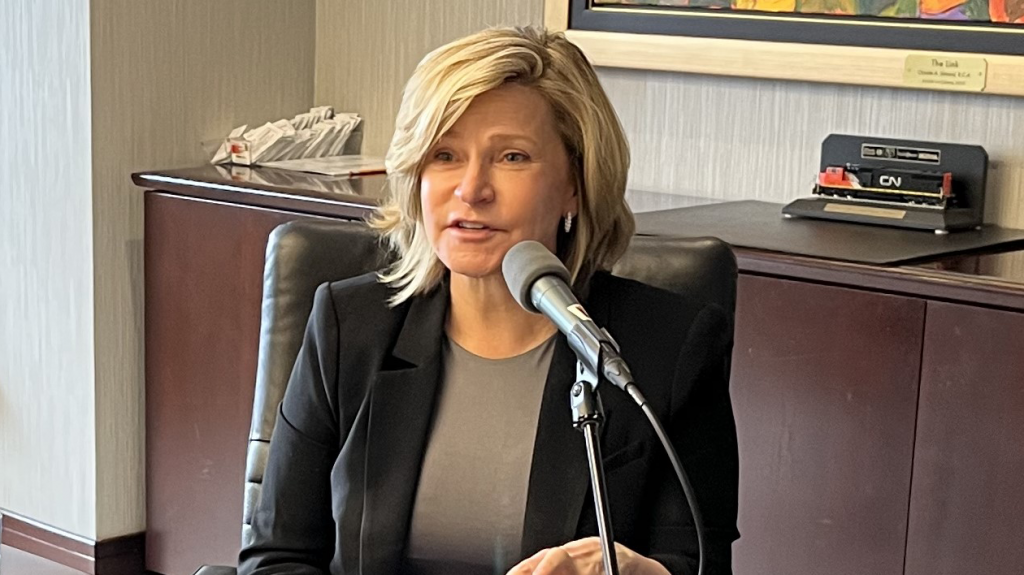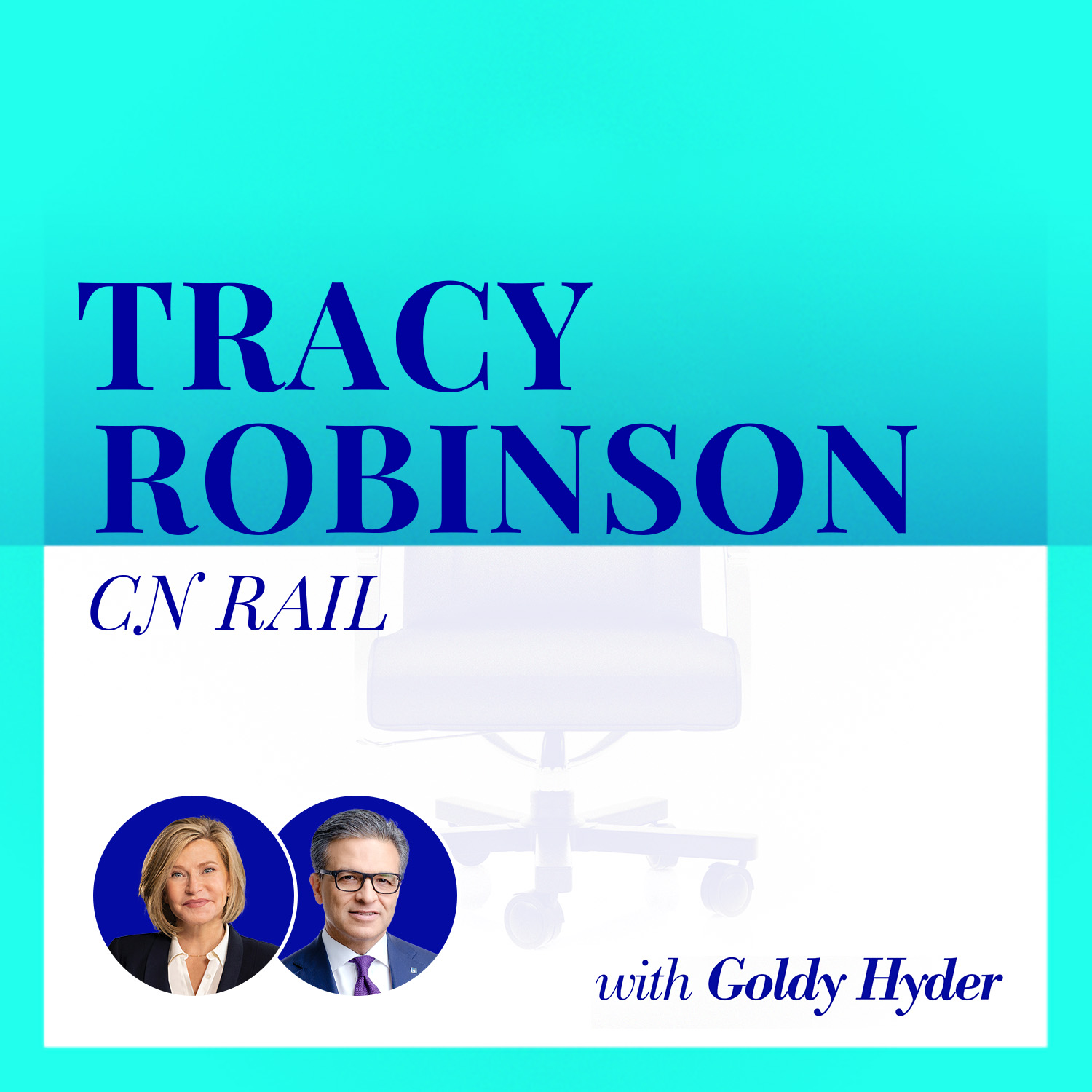Growing up in rural Saskatchewan, Tracy Robinson liked to watch the trains roll by. Little did she know then that trains would have a lasting impact on her life.
She spent 27 years working at Canadian Pacific Railway before switching to the energy sector for almost a decade. Last year she returned to her roots when she was appointed President and CEO of CN, a job she calls “the best in the world.”
Overseeing 30,000 km of track across Canada and the United States, Robinson understands the integral role rail plays in North America’s complex supply chain.

“We need the supply chains to be effective, highly performing, and resilient,” she tells Goldy Hyder on the Speaking of Business podcast. “Things are moving quickly. Trade flows are changing quickly. And if we want to be able to participate the way we know we can as a country, we need to be able to move with it.”
Robinson sees great opportunity for Canada to share its resources and its ingenuity with the rest of the world provided the country adopts a more ambitious approach to economic development. Among other things, that means ensuring greater regulatory certainty and predictability for infrastructure investments. “Whether it be economic or whether it be climate, environment, we are part of a much bigger community and we can be a much more important part if we step into it.”
Listen to Goldy Hyder’s full conversation with Tracy Robinson on the Speaking of Business po
Tracy Robinson:
The magic in leadership is being able to open an organization up to realize exactly what they’re capable of and imagine a future that is different than where we are now and finding yourselves taking steps towards it.
Goldy Hyder:
Welcome to Speaking of Business, conversations with Canadian innovators, entrepreneurs and business leaders. I’m Goldy Hyder, president and CEO of the Business Council of Canada. Some of you know that I grew up in Alberta. Living in a prairie province, I developed a great appreciation for the vastness of our country. I watched long trains travel west with Canadian goods bound for foreign shores. I watched equally long trains travel east with imported products heading to other parts of the country. Watching a train is like watching Canada’s economy in action. A train is an integral link in our complex supply chain. Many of those trains are operated by CN, Canada’s largest railway. The company is more than a hundred years old, operating 30,000 kilometers of track throughout Canada and the United States. And today, the responsibility for operating that vast and complex network falls on the shoulders of president and CEO Tracy Robinson. No pressure there! I’m delighted to be at CN headquarters in Montreal today to speak with Tracy. Welcome to the podcast, Tracy.
Tracy Robinson:
Goldy, anytime for you.
Goldy Hyder:
Well, let’s dig right in. We’re talking in downtown Montreal at CN headquarters in February, six degrees. A year for you, almost.
Tracy Robinson:
A year indeed. And by the way, it’s way warmer this year than it was last year this time.
Goldy Hyder:
Yeah, we’ll come to that because that’s obviously an important issue. It’s not something we should necessarily be celebrating. But let’s talk about the year that you’ve had. You’re a Western Canadian like I am. You’re University of Saskatchewan. I’m from Alberta. You’re out in Quebec now. You’re the CEO of the railway, and big footprint, largest railway and largest in terms of your distribution and so forth. How’s it going? How are you doing?
Tracy Robinson:
It’s going well. I have the best job in the world from my vantage point. Being here in Montreal is fantastic, but this network that we have at CN goes all the way across the country from Vancouver and Prince Rupert on the west to Halifax in the east and down to the Gulf Coast in the south. So I come home every day to Montreal here, but during my day I’m out either physically or literally across all the parts of the continent. And that’s a privilege to be part of so many different businesses. So loving it.
Goldy Hyder:
Anything surprised you so far?
Tracy Robinson:
You know, I had stepped away from the industry for eight years. I spent a lot of years in the railroad industry at the first part of my career, stepped away, and as I came back, what was nice is there was a lot that was familiar. But the thing that I noticed that was most different and most surprising was how significantly the technology side of the business has advanced. Many people look at trains and they don’t think about technology. But the application of the use of data, the application of the use of other technologies to be able to anticipate is significant, if you think about rails, and we now have lasers that will look at things that we couldn’t possibly see. Issues around rail, whether it be brakes or other abnormalities, has decreased 90% in the last 20 years. And that’s technology. And we’re just starting on that. What’s ahead of us is stunning and pretty exciting.
Goldy Hyder:
Let’s stay with that topic, because I often hear leaders say that every business today is on a journey to becoming a technology company.
Tracy Robinson:
Mm-hmm.
Goldy Hyder:
But the perception of railway is you’re old economy. How does a railway become a technology company? What are you doing? What are you seeing? And as you said, it’s early days in terms of modernization and innovation in this industry.
Tracy Robinson:
It runs the full spectrum. So we still have trains that run down tracks, and then that’s the most visible part of our business. But supporting that is an array of data and systems and capabilities that can not only monitor the quality of the track, of the ballast, of the undercarriage, it can pick up the heat of the wheels that are going across a sensor. It can pick up, through laser, early indications of defects. So the impact on the safety of our operation has been significant.
But as importantly, the impact on our ability to perform as part of a larger supply chain and the need for us to all be really resilient about that has improved significantly. And as we look out into the future, that capability to sense what’s going to happen, to be prepared for it, and to prevent it is going to be critical. But our ability to communicate data across integrated supply chains is what really is exciting about the future of how we think about global supply chains. I know we’re probably going to talk about that.
Goldy Hyder:
Yeah, I mean it’s interesting. I was with the CEO of WestJet, they’re another member of the BCC, last week, and he was talking about how you get a lot of attention on the airlines, but there’s a supply chain issue here that works from airports and from security and from… and other things. How is it in your business where you’re really not people movers-
Tracy Robinson:
Mm-hmm.
Goldy Hyder:
… right? It’s product movers. How are you finding the system, the link, the chain working? Where are the gaps that we can make this industry stronger?
Tracy Robinson:
Oh, it’s the same in our business as it is in Alexis’s business. So we are one part of a much broader supply chain. If you think about all the globalization that’s taken place in the last 30 years, that has required the development of really, really integrated supply chains. So if you are producing something at a production facility, you may touch rail. That may be transferred to a truck in a warehouse. Or if you’re reaching into global markets, it’s a port or a terminal and it’s vessels and another terminal on the other side. And the supply chain really only functions as the sum of the parts as we look at it. So it goes well when it goes well, but if there’s a problem or an issue or a shock to any one of the pieces of the supply chain, it can impact the performance of the whole. Very much the same case it is when you’re moving people.
Goldy Hyder:
You mentioned ports. Canada’s of course a trading nation.
Tracy Robinson:
It is.
Goldy Hyder:
We have to get a lot of product out to market. Are we keeping up with our capacity to export as we look forward in terms of demand for energy, demand for critical minerals, demand for food? Big concern.
Tracy Robinson:
The opportunity is significant for Canada.
Goldy Hyder
Isn’t it?
Tracy Robinson:
We have this gift of resources and the gift of capabilities. And as a country, we’re part of a much bigger global economy. And we’re performing and have performed over time in that, but the opportunity for us to step up to the next level is huge. And I would argue that it’s a requirement, it’s a demand for us to step up to the next level, whether it is the export of our natural resources, whether it’s the import of consumer goods. If we look at this from our system, about a third of our business is around products that are moving globally, either coming in through ports or leaving through ports in the west coast of this country, in the east coast, or down on the Gulf Coast. About a third of it travels back and forth across the Canada-U.S. border, and the rest of it is local within markets within Canada, the United States. But in all of those cases, as Canada, we need the supply chains to be effective, highly-performing, and resilient. Things are moving quickly. Trade flows are changing quickly. And if we want to be able to participate in the way we know we can as a country, we need to be able to move with it.
Goldy Hyder:
Some say that if it wasn’t for the fact that we built the arteries of this country over a century ago, we probably couldn’t do it today.
Tracy Robinson:
I think that’s true.
Goldy Hyder:
What does that say about us?
Tracy Robinson:
It’s frightening, right? So I’ve spent my career around big infrastructure, building and operating it, whether it’s energy infrastructure, whether it’s railroads. And it is the heart, not only when we first started to build this country, of settlement and of building our first economies, but it’s also what allows our economy, Canada, North America, to function and gives it the prospect for growth. And if we can’t find a way in this country to be able to create some certainty and some predictability into how we operate our infrastructure and how we expand our infrastructure, how we finance it or attract capital markets to that, then we are going to miss a good chunk of the opportunities as we look forward. If we think about the lost opportunity in supply chain of LNG, of some of the energy projects of the last 20 years, if we look at that lost opportunity and what we… the time it-
Goldy Hyder:
How quickly… It could be come and gone within six months.
Tracy Robinson:
Exactly. And the time period it takes us to determine, as a country, as a government, as a regulator, whether or not we want to step into those things, the market could have passed us by. It’s good only if we learn from the experiences of the past. We’ve got an opportunity to step up. We need to get organized around how to do it.
Goldy Hyder:
I’ve often said that these infrastructure issues are really potentially about sovereignty. It’s the capacity for you to control your own destiny of selling your own goods to the markets that you choose to. Now obviously, you operate in the United States as well. I think your 22,000 employees are spread all over. Do you find it easier there?
Tracy Robinson:
In some ways. I think every jurisdiction has its unique problems and you have to come at it through the lens of solving unique solutions. And in Canada, we need to understand that our gifts and natural resources and capabilities, we’re a very, very large country. If we can’t rely on the access to our infrastructure, we will become a very small country before very long.
Goldy Hyder:
Okay, let me go back to where I wanted to start with you, which is that experience of being a western Canadian and now here in Quebec, and one who, as you said, travels extensively. How do you feel about our country? How do you feel about where we are, and how do you feel about the opportunity for us to compete in the world?
Tracy Robinson:
It’s a privilege to be in a position in which I travel a lot, because you get to see all parts of Canada but different parts of the continent as well. And we’ve got a great thing going in Canada. I would say those of us who live here, were born here, we’ve won the geographic lottery in some regards, our country where we have great resources, we’ve got great capabilities, and we’re also a country and a community.
Goldy Hyder:
It’s almost hard to screw it up, some would say.
Tracy Robinson:
It is, but we care. We care about each other. We care about the communities. We care about how we do it. And I think that that can be a great asset and should be part of our selling feature. We still have to find a way to make it work every day, and I think that’s our greatest challenge and our biggest opportunity. So I’m proud to be Canadian. I’m proud to be a country that thinks hard about the how we come to our work every day into the world, but I want to be part of a country and a community that’s really good at doing it well. We have to get it done, and we’ve lost a bit in the pausing of thinking through that. We need to find a way to step into it.
Goldy Hyder:
So what is it that’s holding us back?
Tracy Robinson:
Oh, isn’t that the question, if we could answer that one simply and we could fix it simply. I think that we have aspirations to advance into our future in the right way. We have not yet done the work in the detail of that to figure out how exactly that works as we develop our infrastructure and economy. So no one can argue with the broad principles that we’re having discussions on in this country. The question remains is, are we willing to do the work on what that means when it comes to an actual project or economic opportunity, where those two meet each other in a way that benefits all of us?
Goldy Hyder:
So if you look around the world, many countries are now seized with this sort of notion of, what’s our industrial policy? What do we want to be when we grow up? And as you said, we won a geographic lottery. It’s kind of easy to be Canada in many ways. But if we could start charting the course towards that industrial policy, what do you think we should be aspiring to and how?
Tracy Robinson:
So as lucky as we are to be Canadian, we’re a very, very large company… country, rather.
Goldy Hyder:
And companies too, luckily, and we want to keep them that way and help them grow.
Tracy Robinson:
And companies, too, and industries that can… And those industries are important to us, but they need to come to bear in the right way. And as a country, that’s what the question is, is how do we bring that to bear? We have to live in a global economy and as we talk about climate, we live in a global environment. And so when we think about where we’re going and what we want to do, how we organize ourselves, more of it needs to be through that global lens.
Goldy Hyder:
Well, you would think that of all the places in the world, Canadians would be well situated to do that. Outside of Indigenous people, every one of us traces our roots back to somewhere else.
Tracy Robinson:
Exactly. And we have this culture where we all want to help, and that fits perfectly. And we happen to have resources, and capabilities, but resources that the world needs, whether it be agriculture, we feed the world from this country, whether it be energy products and the way that we develop our energy products to the highest environmental standards in the world, right? The world needs those. So we need to think about how we operate as part of a much bigger global community, whether it be economic or whether it be climate, environment. We are part of a much bigger community and we can be a much more important part if we step into it.
Goldy Hyder:
Now, as you know, at the Business Council of Canada, we’re really of the view that there’s sort of three strategic advantages to being Canadian. One is we’re a very welcoming society for talent, for people. Our history is of that. Two is the natural resources that we have. We call it power, but all the resources, whether you’re talking hydro or forestry or agriculture or oil and gas, whatever the case might be. And then the last one really is proximity to the United States of America. So I want to ask you, given that you’re also operating in the United States, how do you feel about our relationship, Canada-U.S., and sort of where the opportunities as we look at a government in America that’s extremely aggressive on attracting both talent and capital with the Inflation Reduction Act? How do we respond?
Tracy Robinson:
Well, we need to respond, firstly. This is a very competitive world, and we are competing whether we like it or not. The United States is our friends and our brothers. They’re our neighbours, and we are part of each other one way or another. And we’re more alike than different in some ways, but we compete with them, as you say, whether it’s for capital, whether it’s for labor, whether it’s for markets, whether it’s for industries.
What we want, I think, if I could speak on behalf of the industries in Canada, is a level playing field. And I think after we get a level playing field, we can compete and we will be there and we will step into the potential of this country and every industry in this country as we do that. And so that’s the conversations we need to have, is what does a level playing field look like and how do we get there?
Goldy Hyder:
Hallelujah. I’ve heard that from everyone, saying if there’s one thing Canadians can do, it’s not just compete in sports but compete in business and in every other walk of life. In some ways we need almost that own-the-podium attitude in business. What are we really good at? Where are the gold, silver, and bronzes available to us?
Tracy Robinson:
And there’s an idea. There’s how we should structure it, Goldy.
Goldy Hyder:
Well, it’s worth trying. You talked about, and we touched on it and I wanted to spend a little bit more time returning to the topic of climate change, the issue of our time. COVID aside, this is really the biggest existential threat to our society globally. Talk to me about what CN is doing and then what part it’s playing in that.
Tracy Robinson:
As I come into this company, I would say it’s been another impressive feature of how the thinking has evolved over the past. So we started down this path a long time ago, and so we are well into a program of towards net zero. We’ve reduced our emissions intensity by 43% since 1993, and it’s really just begun. We also have the privilege of being part of an industry that in itself is part of the solution. So we are very emissions-friendly if you think about the options around transportation, relative to trucks and other forms of transportation. Even on day one there are a lot of advantages to rail in that regard.
When you think about how we step into the future as a railroad, 85% of our emissions come from locomotives and come from the propulsion, so there is a great future out there in new forms of propulsion that will be emissions light or emissions-free. As we move towards that, the first step is our fuel efficiency, basically how you drive a locomotive, the same as how you drive a car. And we’ve made great strides. That’s largely what’s behind the 43% improvements, the way that we run our system and our locomotives. We’re the best in the business, the best in North America by about 15% on fuel efficiency. Then we’re starting to blend some of the fuels with biodiesels and renewable diesels.
Beyond that, we’re all experimenting with what’s that next level of propulsion, what will fuel the locomotive of the future? And we’re experimenting with electricity. We’re experimenting as an industry with hydrogen-
Goldy Hyder:
Fuel cells.
Tracy Robinson:
… fuel cells. We will find that. And as an industry, for road locomotives, there’s really only one choice. We have to make the same choice, whatever it turns out to be, because we’re a very collaborative and integrated industry. So if I have a train that departs from Montreal and goes down to Chicago and beyond, that locomotive is going to be riding on somebody else’s railroad. We have those agreements in place. So we need to make the same decision, all of us. And that’s out there. I’m not sure yet what it’s going to be, but there’s lots of work going on. But it’s not a waiting for that day. We’re all moving towards much greater levels of fuel efficiency and emissions reduction.
Goldy Hyder:
Where did the customer fit into all of this? I mean, we saw in Europe the experience where they moved almost too soon too quickly with renewable. Gas prices went shooting up and they said, “Look, I can’t afford it,” and on came coal plants. How do we make sure that we bring the public with us on this and they understand that they have to have some skin in this game too?
Tracy Robinson:
Mm-hmm. Well, I think we think of customers in a couple of ways. One is that our customers are the industries-
Goldy Hyder:
Yes.
Tracy Robinson:
… firstly. And so they are all going down this path themselves. So as we all expand our thinking from scope one to scope two to scope three, we’re working in a much more integrated way with our customers on these things around what is the fewest miles they can travel when they need to use a supply chain. They care about the fuels that we burn. So we’re becoming even more integrated-
Goldy Hyder:
More integrated.
Tracy Robinson:
… from that perspective.
Goldy Hyder:
But the customer at the very end is me and I pay.
Tracy Robinson:
But the consumer…
Goldy Hyder:
Yeah, the consumer.
Tracy Robinson:
And all of this comes at a cost. But the one thing that we’ve learned through the pandemic and through all the uncertainties that have followed that, whether it’s the unrest in Europe, whether it’s the question now of what’s the future of globalization, nearshoring, how strong is the economy, are we in a recession and what does that look like, what is the future of labor markets, as we think about all of that, we need to come together in a different way. But it’s testing the reliability and the reliance of supply chains. And I think the resilience factor is more front and center in everyone’s mind than it ever was before. Are we going down a path that is resilient and that we can stick together? And I think we’re having different conversations even as consumers than we had before.
Goldy Hyder:
I struggle asking this question because it’s very leading, and I don’t know how else to say it, but what is it about our culture that there is a sense of comfort and complacency, that there isn’t the urgency or the ambition that you’re speaking of right now?
Tracy Robinson:
Goldy, I don’t know how to answer that question. We-
Goldy Hyder:
Well, you grew up in the West like I did.
Tracy Robinson:
I did.
Goldy Hyder:
Don’t you feel there’s a real sense of entrepreneurialism and a get-her-done kind of attitude and…
Tracy Robinson:
Well, there is, and-
Goldy Hyder:
It’s there.
Tracy Robinson:
… I grew up on a family farm in Saskatchewan. And how your world went, how your day went, how your future went depended on how hard you worked. And that’s the kind of community that we grew up around, and you cared about everything. Maybe we’ve come to a time where it’s not as difficult.
Goldy Hyder:
As I said, it’s a bit leading because what I see as I travel around the world is a lot of ambition with a lot of urgency attached to it. And then-
Tracy Robinson:
And you think that we don’t have that.
Goldy Hyder:
I’m concerned. Well, certainly not relatively.
Tracy Robinson:
Yeah.
Goldy Hyder:
Certainly not relatively. And so I say these questions more for all of us who are listening and others to think about that. What is it? Because it’s so easy to just blame Ottawa. It’s just a simple thing to do, right? But it’s much more than that.
Tracy Robinson:
You know, what I like about Canada is that we do have a strength in our national identity, and I would like to see us want more for our country. We are very humble, but that doesn’t mean that we can’t aspire highly on our ability to compete, on our ability to contribute. And we should be… We talked about Canada versus the United States and level playing fields. We should be demanding that and walk side-by-side with the best in the world on all of these platforms. It’s a good question around how we get there.
Goldy Hyder:
And yet we’re a country that has interprovincial trade barriers-
Tracy Robinson:
Yes.
Goldy Hyder:
… which must affect your business too.
Tracy Robinson:
It does indeed, and the level of complexity that those kinds of barriers can bring is-
Goldy Hyder:
Self-made, by the way. Own goals, I call them. Own goals.
Tracy Robinson:
Astonishing and self-made, you’re right. And we need perhaps a little bit of self-help every now and then.
Goldy Hyder:
Yeah, so it’s kind of hard to go tell the others, “Be free traders,” while we’re not inside the country. So, okay. One of the big issues in the country, of course, is labour shortage. We have very low unemployment, but we are an aging population. Where are you finding your workers, and are you finding your workers?
Tracy Robinson:
I must tell you that in the year that I’ve been here, as I move across our network and meet our customers, it is one of the things that comes up every single customer, every single industry, is the shortage of labour. And we would be no different. It’s perhaps surprised us all a little bit, but the bubble of baby boomers that we all watched move through our organizations, we don’t have enough people behind that as a country, without a doubt. And we don’t have enough, and we’re hiring in our organization as well. And wouldn’t it be a shame, absolute shame, if we slowed the economic growth of this country because we can’t get enough people. It’s something we need to work very hard on. It’s mobilizing the workforce that we have. We have work to do on that front, Goldy, I think, in-
Goldy Hyder:
Foreign skills accreditation comes to mind, amongst other things.
Tracy Robinson:
Exactly. It’s some of the more remote communities, and the railroads run in a lot of remote communities. It’s our Indigenous communities. There’s still sectors of our population that we’re not reaching. And it’s important that we find ways to do that and find ways to do that that offer solutions to those communities and those families.
Goldy Hyder:
Well, Indigenous is the best example, right? Youngest population in the country here, 50% and growing.
Tracy Robinson:
And growing fast. Growing, I think, the fastest.
Goldy Hyder:
You just need the skills.
Tracy Robinson:
You just need the skills. And so it may not be a traditional approach to attracting this workforce. We may need to step in and help in different ways or step in earlier. And I think that that’s the right thing for us to do, but it’s also there’s a business urgency around getting that figured out.
So there’s the immigration issue that we’ve all talked about. This country needs to figure that out, and all of the support structure that we need as a country in order for that to work properly. But there’s another piece here as well. We talked about it earlier, and that is technology. It would be a shame if we couldn’t get enough people and the economy slowed and we’d failed to lean into all of the potential of technology. And so I think we need to keep that discussion going as well, not just for the new capabilities it gives, but for also the automation capabilities that it gives us so that that workforce that we have, we can point in the direction of things that we can’t automate, the brain power that we need, the skills that we need to lead us into the next way that we’re going to work. So these in my mind are two very parallel, equally important streams of thought and work.
Goldy Hyder:
Look, there’s so many issues that we’ve covered here, but one I want to conclude with is many of our listeners are young aspiring leaders. You’ve had an interesting journey. Two very different sectors, but infrastructure-related in both cases. Just tell us a little bit about your story, your leadership story. How did you end up in this chair?
Tracy Robinson:
It doesn’t feel like a long time, but it probably would look like a long time from a lot of folks. As I told you, I grew up in a farming community in Saskatchewan. Watched the trains go by. Were reliant on the trains as a farming community. And so when I graduated from university, it was one of the offers I got and it made sense to me. I liked the idea of how important the work was, and I spent my first 27 years with Canadian Pacific and had the tremendous opportunity there to work in all kinds of different places in that arena.
Goldy Hyder:
By the way, is this kind of like an Oilers/Flames switch thing or a Leafs/Canadiens thing?
Tracy Robinson:
Well, you know what? The good thing is this country, this continent, needs both of us.
Goldy Hyder:
Both of us, exactly.
Tracy Robinson:
And we are getting really good at knowing where to compete and where to cooperate, and I think that’s important to everybody in Canada-
Goldy Hyder:
I’m sure that reassures our listeners.
Tracy Robinson:
… including us. But it’s been a great journey. But lots of opportunities touch different types of places and businesses within those. But what I’ve become really drawn to is the impact that you can have whether you’re sitting inside a railroad or whether you’re sitting inside an energy infrastructure company or anything else. Our ability as Canadians to step into the future is critical for all of us.
And you know what? At the end of the day, some things that are different between companies and industries, but there’s a lot that’s similar when it comes to leadership. Leadership isn’t really as much around being the smartest person in the room. It’s not about being the one that knows exactly what the next step is. It’s not about that. So it takes you a while to learn that. But leadership is really about imagining a future and around understanding that the capability and the capacity of a team or an organization or a group of people is probably far bigger than you or they understand. And the magic in leadership is being able to open an organization up to realize exactly what they’re capable of and imagine a future that is different than where we are now and finding yourselves taking steps towards it. I think that that’s where I get excited about the future of companies, of industries, of people, and of Canada is when I think about what’s possible. We are capable of so much, and it’s our job as leaders to imagine it.
Goldy Hyder:
That’s a great answer. I’m just going to ask, you’re in an industry where I think COVID would’ve had less of an impact on the return-to-work issue. How are you managing that?
Tracy Robinson:
So 85% of our people-
Goldy Hyder:
No choice, right?
Tracy Robinson:
… got out every day and figured it out-
Goldy Hyder:
During COVID, too.
Tracy Robinson:
… and ran trains during COVID, and they figured out how to keep the economy running like all of the other essential workers did. And I’m really proud of them and they’re still doing it. And you know what? In a railroad, like most essential work, we do it 24/7, regardless of the weather, no matter what it’s doing, our folks get out there and they make it happen. And we all owe them a great deal of thanks. There are the rest of us that support that effort more from office jobs. And as I come into this company, it’s been a question of whether we come back and how we come back to the office. Right now, we’re back three days a week. I feel strongly about it. I think that the big challenge in front of us is we’ve watched the generation change, we’ve had the great attrition of the baby boomers, is how we build the next generation to step into all of these challenges. And it’s really difficult to build culture, to build connectivity, to build excitement, and to develop skills.
Goldy Hyder:
To have relationships.
Tracy Robinson:
To have relationships and to understand the importance of the work that we all do when you’re just talking to someone virtually. Thank goodness that we figured it out and how to do it, and we kept everything going. It’s quite amazing, if you think back on it. But now we got to figure out how we lift out of the pandemic era and how we develop that next generation and how we get them connecting and imagining what’s possible in the future and actually stepping in and making it happen. And the good news is there’s so much opportunity for this next generation. I’m excited for them and I want to be part of creating that opportunity to help them kind of step into it.
Goldy Hyder:
Well, I asked that question because we were talking about leadership, but COVID was something no one could prepare for.
Tracy Robinson:
Right.
Goldy Hyder:
It happens once every hundred years. As a leader, what did you learn about yourself through this process?
Tracy Robinson:
I learned firstly how much I need connectivity. I am impressed that we kept it all going and really impressed because I wouldn’t have guessed that. When we left the office on that day in March…
Goldy Hyder:
March 20th, I think, or something like that, or 13th, or-
Tracy Robinson:
Yeah, I really thought it was two weeks, right?
Goldy Hyder:
Yeah.
Tracy Robinson:
I really thought it’d be a couple weeks.
Goldy Hyder:
Yeah. Yeah.
Tracy Robinson:
And it was years, really, before we got really… and we’re still getting settled back into it.
Goldy Hyder:
We’re still getting out of it, yeah.
Tracy Robinson:
So, speak about resilience? We demonstrated that as a world, as a globe in a lot of regards, and that’s impressive. And it gave me faith in the human capability, which is good. I learned sitting in my den at home how much my thinking process, my creativity, rests on having other people in front of me and thinking together. We learn different ways to kind of connect and do that through the virtual platforms, but there’s nothing like sitting with people and thinking through things and creating the next idea.
Goldy Hyder:
I want to end on a positive note in terms of looking forward and optimistic. What are you most optimistic about?
Tracy Robinson:
I choose to be optimistic, right? It’s easy some days when you see how many problems and challenges there are to not be, but I think we all have to choose to be optimistic. And we are Canadian. As we sit here, we talked about how lucky we are. We have this benefit of the gifts we have and natural resources and capabilities. I think we’re going to figure that out. It’s been challenging on infrastructure, building, operating, bringing this country, keeping it moving, the economy growing. We’ll figure that out because we have to figure it out. And I’m optimistic, I got to tell you, about this next generation. The challenge is significant, but great challenge is when you see generations and people really step up. And I think many of us, you, me, many of us can be part of creating those opportunities. And we’re going to get there. And I wouldn’t be sitting in a chair like this if I wasn’t determined that we’re going to get there and we’re going to be part of it.
Goldy Hyder:
Thank you for doing this.
Tracy Robinson:
It’s a pleasure.
Goldy Hyder:
Tracy Robinson is president and CEO of CN. If you would like to hear more of our Speaking of Business conversations with innovators, leaders, and entrepreneurs, why not subscribe to our podcast? Search for Speaking of Business wherever you get your podcasts, or go to our website at thebusinesscouncil.ca. Yes, thebusinesscouncil.ca. Until next time, I’m Goldy Hyder. Thank you for joining us.











